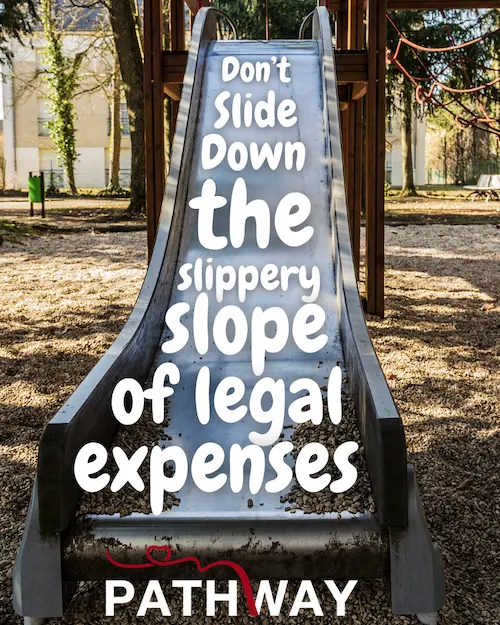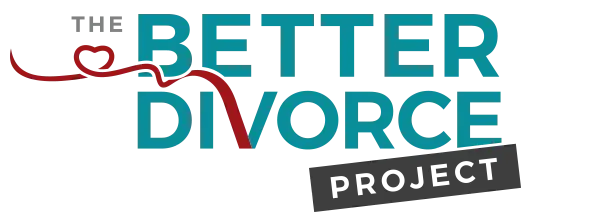Create a better divorce experience join our newsletter for supportive, resolution focused information!
How Much Does Divorce Cost?
- Home
- Our Services
- Cost of Divorce
There are so many factors involved in resolving a divorce or separation that the question how much does divorce cost in BC is often confusing—until you understand your options.
As family law lawyers, we need to know your circumstances and the issues that will need to be addressed before we can give you a clear picture of the legal costs you may incur. This is an essential step otherwise you can enter a slippery slope of growing expenses.
The cost of divorce in BC depends on many different factors, including:
- you,
- your ex-spouse
- the level of conflict
- the number of legal issues that need to be sorted out
- the complexity of your financial circumstances
- the complexity of your income
- and even, who your ex hires as their lawyer!
For example:
- is yours a high-conflict divorce, or are both partners amicable and cooperative in their approach?
- Is there a chance the matter will end up in court, or have you and your soon-to-be ex-partner already worked out most of the details?
- Are children involved, and is there an imbalance of income to consider?
Read more...
This article by Val Hemminger, founder of Pathway Legal, explores how much a divorce lawyer can cost in BC—whether you're located in Victoria, Abbotsford, Vancouver, or any of the surrounding areas. Val provides a clear overview of the options and typical costs you may incur when thinking about getting divorced or formalizing a separation. Please note this is general information and not legal advice. You must speak to a Pathway family law lawyer for specific advice based on your unique situation.
Quick Links
A “divorce” is an order from the court that says you are no longer married to your spouse. But many don't realize that it's not the first step...
Most of the time, when people are talking about getting a divorce, they are really talking about wishing to settle their family law matter. That is, they want to reach a legally binding separation agreement that will address the following questions:

- How will we divide our assets?
- How are we going to divide our debt?
- What happens with my inheritance?
- What will happen with the house/condo?
- Will I have to pay spousal support?
- Am I entitled to spousal support?
If you have children, there are lots of common questions:
- What is the parenting schedule going to be?
- What do I do if there is parental alienation?
- What is the child support going to be?
- Do we still have to pay child support if we share the kids equally?
- How much will each of us be contributing to our kids’ special expenses?
- What happens if we disagree about a significant decision regarding our kids?
What is the family lawyer cost per hour?
In 2025, divorce lawyer fees range from $200 to $600 an hour
When hiring a family law lawyer in BC, one of the most common questions is the family lawyer cost per hour, or hourly rate. Unfortunately, sometimes when people hire lawyers with a low hourly rate it doesn't actually save them money. While sometimes it does save money, often it does not.
Lawyers who work for themselves set their own hourly rates. These are determined based upon the lawyer's skill and years of experience. Lawyers who work for law firms often have their family lawyer cost per hour set by their law firm’s management.
If you think $200 to $600 an hour seems like a big range to consider for the cost of a divorce lawyer, you'd be right!! There are many factors and some are not so obvious. The fee a family lawyer can charge depends on:
- the lawyer’s reputation
- their years of experience
- the overhead and structure of the law firm
- the complexity of your case.
When hiring a family law lawyer in BC, one of the most common questions is the family lawyer cost per hour, or hourly rate. Unfortunately, sometimes when people hire lawyers with a low hourly rate it doesn't actually save them money. While sometimes it does save money, often it does not.
Lawyers who work for themselves set their own hourly rates. These are determined based upon the lawyer's skill and years of experience. Lawyers who work for law firms often have their family lawyer cost per hour set by their law firm’s management.
Read more...
If you think $200 to $600 an hour seems like a big range to consider for the cost of a divorce lawyer, you'd be right!! There are many factors and some are not so obvious. The fee a family lawyer can charge depends on:
- the lawyer’s reputation
- their years of experience
- the overhead and structure of the law firm
- the complexity of your case.
Need a DeepER Dive?
If you are looking for a family law lawyer we suggest that you don't take the decision of choosing your lawyer lightly. Review the information we provide in our article, choosing the right divorce lawyer for your matter thoroughly, so you aren't "caught short".
How Your Choice Shapes The Cost of Divorce
How much a divorce costs, also depends on the type of process you choose to settle your matter.
At Pathway Legal, we provide our clients with a rough estimate of how much your matter will cost based on which of these processes you utilize to get your family law matter finalized and settled:
- Fast and Frugal Agreement
- Negotiation between lawyers
- Four-way meetings
- Mediation
- Mediation/arbitration (our favourite!)
- Collaborative Law
- Arbitration
- Court (our least favourite, but sometimes necessary).
So, let’s dive into each of these to give you an idea of how much a divorce costs in BC.
Fast & Frugal Agreement
Let’s assume that you have already met initially with a lawyer, and you and your soon-to-be-ex-spouse have a general idea of what your legal rights and responsibilities are. Additionally, your financial circumstances are not overly complex, and the two of you are generally amicable.
This can be a great fit for you! In these situations, our clients will write out a rough idea of their agreement by themselves and then have one of the lawyers at Pathway Legal draft their final and legally binding separation agreement.
When the Fast & Frugal agreement is a viable option our clients, we usually charge them a flat fee. Our clients love this because they understand the extent of their investment for their separation agreement.
Read more...
When we have drafted a Fast & Frugal agreement for you, we always highly recommend that the other party get independent legal advice.
When you pay a flat fee for your separation agreement, we not only draft the legally binding agreement for you, but we also meet with you for up to two hours of time, and we will make revisions if your ex-spouse’s lawyer has reasonable suggested changes.
Despite the obvious attraction of the Fast & Frugal Agreement, most of the time, our clients need more support, advice and direction. They need the assistance of one of our lawyers to help them negotiate and reach a full settlement.
In such cases, our fee arrangement is that you pay your lawyer our hourly rate. Our hourly rates are listed here.

NEED A DEEPER DIVE?
Want to know more about how the Fast & Frugal option works? We have the full process right here...
If you believe you may be able to take advantage of the Flat Free rates, experience a deep dive with all the facts, at our flat fee divorce rates page.
Negotiation Between Lawyers
In our experience, the investment for this service ranges from $4,000 to $5,000 in legal fees, plus taxes and any other out-of-pocket expenses.
Negotiation between lawyers can be highly effective, but it’s crucial not to let the process drag on unnecessarily.
If your lawyer and your ex-spouse’s lawyer haven’t reached an agreement after one or two written exchanges, it will be time to consider other options available to finalize your matter. Continuing to pay for repeated letters between lawyers with little progress can quickly increase your legal fees without moving you closer to a resolution.
Consider consulting your lawyer to explore alternative services if negotiations are not progressing.
NEED To Find something extra?
If you believe you may be able to take advantage of a negotiation between lawyers, check out our Alternative Dispute resolution examples utilizing negotiation between lawyers here.
Four way meetings
A four-way meeting occurs when you, your lawyer, your spouse and their lawyer all sit down and everyone “rolls up their sleeves” and work out the elements of your final separation agreement. A four way meeting usually happens after you have exchanged financial information.
As you can see, there are numerous ways you can resolve your matter that are alternatives to court, take a look at the alternative resolution examples in more detail, here.
Read more...
In our experience at Pathway Legal, if you are able to resolve your matter with the use of a four-way meeting, your investment will likely range between $5,000 to $8,000. Assuming everything goes as planned, for that range, you will end up with a legally binding separation agreement. It is important to remember that a four-way meeting requires that both lawyers involved are non-combative. Make sure you choose the right divorce lawyer for this process.
Mediation
A mediation process is a lot like a four-way meeting, except you have a fifth person in the room. They are your mediator.
A mediator is a neutral person, trained and skilled in dispute resolution and negotiation, who assists you and your lawyers in reaching a final resolution. At Pathway Legal, we find that mediators can be of great assistance when the parties require a bit more assistance than a four-way meeting to get them to an agreement.
In our experience at Pathway Legal, if you are able to resolve your matter with the use of mediation, your investment will likely range between $7,000 to $12,000. This includes the cost of you and your ex-spouse sharing the expense of the mediator.
Divorce arbitration cost: Mediation/arbitration (our favourite!)
The downside about mediation is that if you do not resolve all of the issues at mediation, the parties are often back at square one. They still do not have an agreement, but have invested in the mediation process.
Mediation/arbitration, or med/arb, is a form of alternative dispute resolution ADR. It is commonly used throughout British Columbia and other jurisdictions. It is a powerful and efficient way to resolve family law matters, even in high-conflict situations.
When you do mediation/arbitration, you sign an agreement that if the matter is not resolved at mediation, then the mediator takes off their neutral hat and becomes your private judge. In the end (after legal argument and evidence), the decision/agreement is decided by the med/arbiter, just as a judge would make a decision.
Read more...
In our experience at Pathway Legal, if you are able to resolve your matter with the use of the mediation/arbitration process, your investment will likely range between $7,000 to $20,000 if the matter is resolved at the mediation phase. However, if the parties do not settle during the mediation phase and the matter proceeds to arbitration, the investment will be between $20,000 and $60,000. Essentially, what happens is that the arbitration process is the same as a trial, but with more flexibility. Even though it is expensive if a matter gets to arbitration, it is still, virtually always, much less than the expense of court. This includes the cost of you and your ex-spouse sharing the expense of the mediator/arbitrator.
Instead of having your matter resolved in front of a judge, you first try to mediate the matter (arrive at a fully comprehensive, legally binding agreement), but then if you are unable to make it all the way there, you have already authorized your mediator to arbitrate the issue. This means that your mediator becomes your private judge.
NEED A DEEPER DIVE?
Find out why mediation/arbitration (med/arb) is our favourite method of resolving family law matters in our special section: "Reach an agreement with mediation/arbitration".
Collaborative Family Law
If you are able to resolve your family law matter utilizing the collaborative family law process, in our experience, your investment will range between $10,000 and $25,000 depending upon the level of complexity in your matter and whether or not you have to hire any outside professionals (like a parenting expert, for example).
We have a whole section on How Collaborative Family Law Simplifies Divorce in BC. Review it and see if it will work for you!
Arbitration
Arbitration is, essentially a court-like process, but the process is not conducted in a courtroom, and the process is in front of a private arbitrator as opposed to a judge. When in arbitration, the lawyers and the arbitrator will decide upon the rules and procedure prior to the process getting started, which often dramatically reduces the time required to get to an arbitration award (it is binding, like a court order).
If the matter does go to arbitration, we estimate that your investment will be between $30,000 to $60,000. We know that seems like a lot. However, if you can get a matter done in 2 days of arbitration, those sames issues could take 7 to 10 days of court time. In our experience, each day of court costs our clients about $11,000 to $12,000 (this is not for the court time itself but what is involved in your lawyer preparing for trial such as preparing witnesses, document disclosure, etc.)
Court (our least favourite, but sometimes necessary)
In our experience, the investment for your court matter costs about $11,000 to $12,000 per day of court time. This is not the hourly rate for attending court, but, in essence, for each one day of court, by the time your lawyer prepares for court, gets the witnesses ready, attends court on your behalf, approximately $11,000 to $12,000 is expended for each day.
Court gets expensive quickly. For example, you can often resolve an entire family law matter in one day of mediation, when it takes five to seven days of court time to accomplish the same task. Also, unlike arbitration, where the lawyers and arbitrator will agree to streamline the arbitration process, the court process does not have such latitude. For example, an arbitration day can go from 9 am to 6 pm with a one-hour lunch. Supreme Court of BC on the other hand, does not start until 10 am, and it has a break between 10 am and 12:30 pm. Then it breaks for lunch from 12:30 until 2 pm. There is another break between 2 and 4 pm, and then the court day ends at 4 pm.
Essentially, not a lot gets done in one full day of court. That is why other dispute resolution options are almost always easier on the wallet.
NEED A DEEPER DIVE?
If you wish to get for custody of a child in BC, we cover the section extensively and is a must-read especially if you are likely to experience a court hearing for child custody in BC.
















